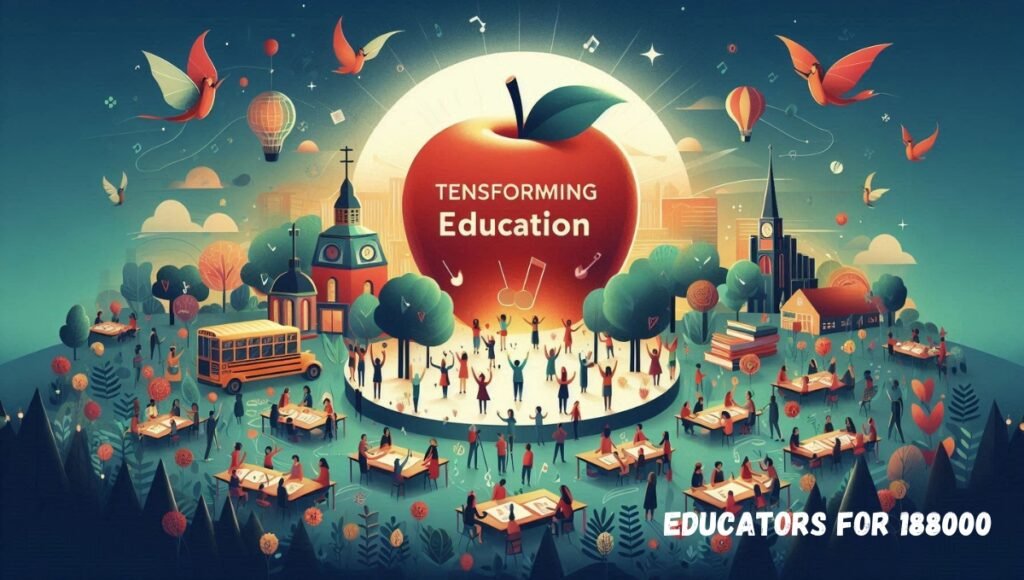Introduction
Education is the backbone of any thriving society. Behind every successful student stands a dedicated educator, someone who tirelessly works to ensure that each learner reaches their full potential. For a population of 188,000 students, the responsibility on educators is immense. These educators are not just teachers; they are mentors, role models, and change-makers. In this article, we delve into the critical role of educators for 188000 students, exploring the challenges they face, the strategies they implement, and the transformative impact they have on the future of education.
The Role of Educators in Shaping the Future
Educators hold the power to shape minds and inspire change. For a student population of 188,000, educators must work with varying levels of academic, social, and emotional needs. The diversity of these students demands personalized approaches to teaching, which can be both rewarding and challenging.
1. Challenges Faced by Educators
Managing large student populations is no easy feat. Educators for 188000 students face several challenges, including:
- Diverse Learning Needs: Students come from different backgrounds, cultures, and learning abilities. Tailoring lessons to meet the needs of each student can be overwhelming.
- Limited Resources: Often, educators work with limited resources, making it challenging to provide the best educational experience. From outdated textbooks to insufficient technology, these limitations can hinder teaching efforts.
- Burnout and Stress: The sheer number of students can lead to educator burnout. Managing large classes, grading, and administrative duties can be exhausting, leading to decreased productivity and passion for teaching.
- Parental Involvement: Engaging parents in the educational journey is crucial but can be difficult with such a large student population. Communication and collaboration between educators and parents are vital for student success.
2. Strategies for Effective Teaching
To overcome these challenges, educators for 188000 students implement various strategies:
- Differentiated Instruction: Recognizing that each student learns differently, educators employ differentiated instruction techniques. This includes offering various learning materials, adjusting teaching methods, and providing individualized support.
- Technology Integration: Embracing technology is essential in modern education. Educators use digital tools, online resources, and educational software to enhance learning experiences and reach more students effectively.
- Collaborative Learning: Encouraging group work and peer collaboration fosters a sense of community and helps students learn from one another. This approach also allows educators to manage larger groups more efficiently.
- Professional Development: Continuous learning is crucial for educators. By attending workshops, seminars, and online courses, educators stay updated on the latest teaching methods and trends, allowing them to deliver high-quality education.
- Building Strong Relationships: Establishing a positive teacher-student relationship is key to student success. Educators who invest time in understanding their students’ needs and interests can create a supportive and motivating learning environment.
The Impact of Educators for 188000 on Student Success
Educators are instrumental in shaping the future of 188,000 students. Their efforts go beyond academics; they influence character development, critical thinking, and social skills. Here’s how educators make a significant impact:
1. Academic Achievement
Educators play a pivotal role in helping students achieve academic success. Through personalized instruction, encouragement, and support, they guide students toward reaching their academic goals. By fostering a growth mindset, educators inspire students to embrace challenges and persist in their learning journey.
2. Character Development
Education isn’t just about imparting knowledge; it’s also about shaping character. Educators for 188000 students instill values such as integrity, empathy, and responsibility. By modeling positive behavior and creating a respectful classroom environment, educators teach students essential life skills.
3. Social and Emotional Learning (SEL)
In today’s world, social and emotional learning (SEL) is just as important as academics. Educators help students develop emotional intelligence, self-awareness, and interpersonal skills. By addressing students’ social and emotional needs, educators create a well-rounded learning experience that prepares students for life beyond the classroom.
4. Inspiring Lifelong Learning
One of the most significant impacts educators have is inspiring a love for learning. When educators ignite curiosity and passion for knowledge, they encourage students to become lifelong learners. This mindset is crucial in an ever-changing world, where adaptability and continuous learning are essential.
The Role of Educational Institutions

While educators are on the front lines of teaching, educational institutions play a crucial role in supporting them. Schools, districts, and educational organizations must provide the necessary resources, training, and support to ensure educators can perform their best.
1. Providing Adequate Resources
Schools must prioritize providing the necessary resources for educators. This includes up-to-date textbooks, technology, and classroom materials. Access to these resources allows educators to create a dynamic and engaging learning environment.
2. Investing in Professional Development
Continuous professional development is vital for educators to stay current with educational trends and methods. Schools should invest in training programs, workshops, and conferences that help educators enhance their skills and knowledge.
3. Creating Supportive Environments
A positive school culture is essential for both educators and students. Educational institutions should foster a supportive environment where educators feel valued and motivated. This includes providing mental health resources, promoting work-life balance, and encouraging collaboration among staff.
The Future of Educators for 188000
As the educational landscape evolves, so too must the role of educators. For the 188,000 students they serve, the future of education holds exciting possibilities. The integration of technology, personalized learning, and a focus on social and emotional development will continue to shape how educators approach teaching.
1. Technology and Innovation
The future of education is closely tied to technology and innovation. Educators will increasingly rely on digital tools, artificial intelligence, and data-driven approaches to enhance learning experiences. This shift will require educators to adapt and continually learn new skills.
2. Personalized Learning
Personalized learning is becoming more prevalent in education. Educators will need to focus on tailoring instruction to meet individual student needs, using data and analytics to inform their teaching methods.
3. Emphasis on Mental Health
The importance of mental health in education is gaining recognition. Educators will play a crucial role in supporting students’ mental and emotional well-being, integrating SEL into the curriculum, and creating a safe and supportive learning environment.
FAQs about Educators for 188000 Students
1. What are the main challenges faced by educators for 188000 students?
Educators face challenges such as diverse learning needs, limited resources, burnout, and engaging parents in the educational process.
2. How do educators manage large student populations effectively?
Educators use strategies like differentiated instruction, technology integration, collaborative learning, and building strong teacher-student relationships to manage large student populations.
3. What impact do educators have on student success?
Educators significantly impact academic achievement, character development, social and emotional learning, and inspire lifelong learning.
4. How can educational institutions support educators?
Educational institutions can support educators by providing adequate resources, investing in professional development, and creating a positive and supportive work environment.
5. What does the future of education look like for educators and students?
The future of education will involve increased use of technology, personalized learning approaches, and a stronger emphasis on mental health and social-emotional learning.
Conclusion
Educators for 188000 students are at the heart of the educational experience. Their dedication, creativity, and resilience shape the future of countless students, influencing not only their academic success but also their character and emotional well-being. As education continues to evolve, educators will remain the driving force behind transformative change, empowering students to thrive in an increasingly complex world. By understanding their challenges and supporting their efforts, we can ensure that the future of education is bright for both educators and students alike.


